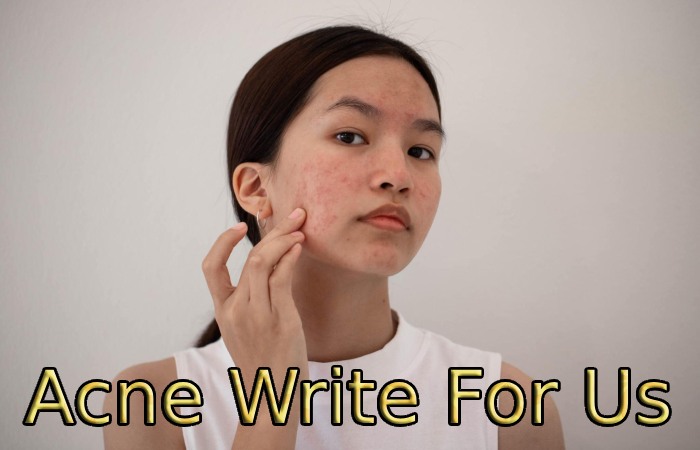
Acne Write for Us
Acne is a common skin condition that begins at a critical stage of life, and it occurs when the hair follicles below the skin become clogged. It can occur because oil and dead skin cells clog pores and break out. It causes pimples, blackheads, and whiteheads. Acne most appears on the face, back, neck, chest, and shoulder and is most common among youngsters, though it affects people of all ages. It is not serious, but it can leave scars.
For most people, acne is gone by the age of 30s, but some people have skin problems into their 40s or 50s. Acne usually happens because hormonal changes, such as those in teens or pregnancy, have something to do with its appearance.
What types of acne are there?
Acne causes several types of lesions or pimples, including:
- those that remain under the Skin and produce a white bump (known as whiteheads or closed comedones);
- those that spread the surface of the Skin and break open (blackheads or open comedones);
- those that cover with white or yellow cuts filled with pus, the base of which may be red;
- those are significant, painful, solid cuts deep within the Skin;
- those that appear as small pink bumps on the skin and can be caring to the touch;
- those that cause deep, painful, and pus-filled cuts.
Who is affected?
Acne is one of the most frequent skin pathologies, especially characteristic of adolescence and youth since it affects almost 75% of the population between 13 and 18 years of age.
It represents 25% of consultations with dermatologists, although the number of talks in pediatrics, general medicine, and pharmacies is even higher. It is a more frequent and severe problem in women than in men.
Tips to prevent and improve acne
1. Avoid touching your Skin
Squeezing and scratching the different scratches caused by acne can worsen the problem and leave scars or dark spots on the Skin. Also, hands can always be potential carriers of bacteria, increasing the risk of infections.
2. Wash your Skin gently
Clean your face twice a day with specific oily skin products and wash and dry without scrubbing. Subsequently, hydrate your complexion with creams or gels suitable for your skin type. Permanently remove make-up at the end of the day.
3. Cleaning the Skin
There are masks and different keratolytic cosmetics that help remove clogged pores. Some medications can perform this function.
4. Be careful in the sun
Although the sun can improve acne, this effect is temporary and can later cause a rebound effect and worsen the lesions. In addition, ultraviolet rays and infrared radiation A (IR-A) can cause serious damage to our Skin in the short and long term, so it is essential to protect yourself adequately with photoprotective treatments suitable for oily Skin. Dry-touch cream gels give you a matte finish.
5. Regularly wash your hair
Especially if you have oily hair, you should always wash it periodically to keep it clean and prevent its oil from passing through the Skin. Separate the hair from the face (bangs, etc.).
6. Follow a balanced diet
The AEDV recommends eating healthy and excluding or minimizing foods with a high glycemic index, such as refined sugars.
How To Submit Article For Beautys Guide?
To submit article, you can pitch us at contact@beautysguide.com
Why Write For Beautys Guide – Acne Write For Us

- Writing for Beautys Guide can give massive exposure to your site for customers looking for Acne.
- Beautys Guide presence is on social media and will share your article with the Acne-related audience.
- You can reach out to Acne enthusiasts.
Acne Write For Us Related Search Terms
- Blackheads
- Pimples
- Pustules
- Rosacea
- Whiteheads
- Zits
- Pizza-Face
- Skin Inflammation
- Blemish
- Blister
- Lump
- Abscess
- Blackhead
- Boil
- Bump
Search Terms – Acne Write For Us
Acne Write For Us
Write For Us Acne
Acne + Write For Us
Write For Us + Acne
Guest Post + Acne
Acne + Guest Post
Submit an article
Contribute Acne
Acne Submit post
Acne writers wanted
Article Guidelines On Beautys Guide – Acne Write For Us
- We at Beautys Guide welcomes fresh and unique content related to Acne.
- Beautys Guide allow a minimum of 500+ words related to Acne.
- The editorial team of Beautys Guide does not encourage promotional content related to Acne.
- For publishing article at Beautys Guide Pitch us at contact@beautysguide.com
- Beautys Guide allows articles related to Beauty, Skin, Hair, Fitness, Fashion, Lifestyle and many more
